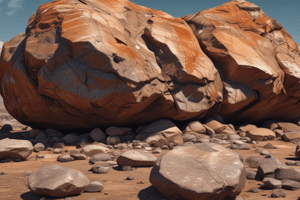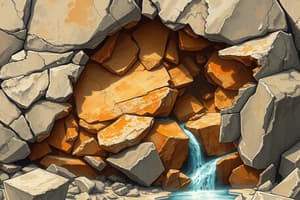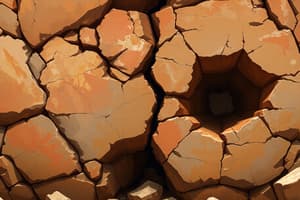Podcast
Questions and Answers
What is the primary process by which rock is broken down into smaller pieces without a chemical change?
What is the primary process by which rock is broken down into smaller pieces without a chemical change?
- Erosion
- Mechanical weathering (correct)
- Chemical weathering
- Sedimentation
Which of the following processes contributes to the cracking and breaking of rocks due to temperature fluctuations?
Which of the following processes contributes to the cracking and breaking of rocks due to temperature fluctuations?
- Oxidation
- Thermal expansion (correct)
- Frost wedging
- Hydrolysis
What effect does the expansion of freezing water have on rock?
What effect does the expansion of freezing water have on rock?
- It cushions the rocks from impact.
- It leads to chemical changes within the rock.
- It results in the physical breaking of rocks. (correct)
- It causes rocks to melt and reform.
What is one common cause of rock peeling away?
What is one common cause of rock peeling away?
What role do rocks colliding with one another play in geological processes?
What role do rocks colliding with one another play in geological processes?
Flashcards
Mechanical weathering
Mechanical weathering
The process of breaking down rock into smaller pieces without changing its chemical composition.
Freezing water expansion
Freezing water expansion
Water expands when it freezes, putting pressure on surrounding rock.
Thermal expansion and contraction
Thermal expansion and contraction
Repeated heating and cooling of rocks leads to cracking and breaking.
Unloading
Unloading
Signup and view all the flashcards
Impact
Impact
Signup and view all the flashcards
Study Notes
Mechanical Weathering
- Rock breakdown into smaller pieces without changing the chemical composition.
- Processes include:
- Freezing water expansion: Water expands when it freezes, putting pressure on rock, causing cracks.
- Repeated heating and cooling: Temperature changes cause rocks to expand and contract, leading to fracturing.
- Unloading: Removal of overlying rock reduces pressure, allowing rocks to expand and crack.
- Rock collisions/impact: Rocks bumping into each other can break them into fragments.
- Peeling: Removal of overlying rock or fluctuations in temperature can cause layers of rock to peel off.
Studying That Suits You
Use AI to generate personalized quizzes and flashcards to suit your learning preferences.




